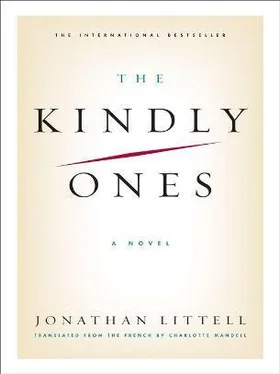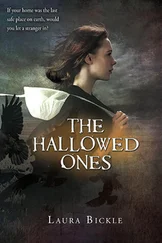Jonathan Littell - The Kindly Ones
Здесь есть возможность читать онлайн «Jonathan Littell - The Kindly Ones» весь текст электронной книги совершенно бесплатно (целиком полную версию без сокращений). В некоторых случаях можно слушать аудио, скачать через торрент в формате fb2 и присутствует краткое содержание. Год выпуска: 2009, ISBN: 2009, Издательство: HarperCollins e-books, Жанр: Историческая проза, на английском языке. Описание произведения, (предисловие) а так же отзывы посетителей доступны на портале библиотеки ЛибКат.
- Название:The Kindly Ones
- Автор:
- Издательство:HarperCollins e-books
- Жанр:
- Год:2009
- ISBN:978-0-06-177548-2
- Рейтинг книги:4 / 5. Голосов: 1
-
Избранное:Добавить в избранное
- Отзывы:
-
Ваша оценка:
- 80
- 1
- 2
- 3
- 4
- 5
The Kindly Ones: краткое содержание, описание и аннотация
Предлагаем к чтению аннотацию, описание, краткое содержание или предисловие (зависит от того, что написал сам автор книги «The Kindly Ones»). Если вы не нашли необходимую информацию о книге — напишите в комментариях, мы постараемся отыскать её.
The Kindly Ones The Kindly Ones Massive in scope, horrific in subject matter, and shocking in its protagonist, Littell's masterpiece is intense, hallucinatory, and utterly original. Critics abroad have compared this provocative and controversial work of literature to Tolstoy's War and Peace, a classic epic of war that, like The Kindly Ones, is a morally challenging read.
The Kindly Ones — читать онлайн бесплатно полную книгу (весь текст) целиком
Ниже представлен текст книги, разбитый по страницам. Система сохранения места последней прочитанной страницы, позволяет с удобством читать онлайн бесплатно книгу «The Kindly Ones», без необходимости каждый раз заново искать на чём Вы остановились. Поставьте закладку, и сможете в любой момент перейти на страницу, на которой закончили чтение.
Интервал:
Закладка:
The mood within the Kommando was becoming execrable; the officers were nervous, they shouted at the slightest provocation. Callsen and the others went back to their Teilkommandos; everyone kept his opinions to himself, but you could see that the new tasks weighed on them. Kehrig left quickly, almost without saying goodbye. Lübbe was often sick. From the field, the Teilkommandoführers sent very negative reports on the morale of their troops: there were nervous depressions, the men often cried; according to Sperath, many were suffering from sexual impotence. There was a series of incidents with the Wehrmacht: Near Korosten, a Hauptscharführer forced some Jewish women to undress and made them run naked in front of a machine gun; he took photos, and these photos were intercepted by the AOK. In Belaya Tserkov, Häfner had a confrontation with an officer from division headquarters, who had intervened to block the execution of some Jewish orphans; Blobel had to go down there himself and the affair went all the way up to von Reichenau, who confirmed the execution and reprimanded the officer; but it created quite a few ripples, and furthermore Häfner refused to inflict that on his men, and left the dirty work to his Askaris. Other officers did the same; but as the difficulties with the OUN-B persisted, this practice in turn engendered new problems: the Ukrainians, disgusted, were deserting or even committing treason. Others, however, carried out the executions without grumbling, but they shamelessly stole from the Jews and raped the women before killing them; sometimes we had to shoot our own soldiers. Kehrig’s replacement hadn’t arrived, and I was overwhelmed with work. At the end of the month, Blobel sent me to Korosten. The “Republic of Polesia,” northeast of the city, was off-limits to us per order of the Wehrmacht, but there was still a lot of work in the region. The officer in charge was Kurt Hans. I didn’t like Hans much—he was a foul man, moody; and he didn’t like me, either. Still, we had to work together. The methods had changed, they had been rationalized, systematized according to the new demands. But these changes still didn’t make the soldiers’ work any easier. Now the condemned had to undress before execution, since their clothing was collected for the Winter Aid and the repatriates. In Zhitomir, Blobel had explained to us the new practice of Sardinenpackung developed by Jeckeln, the “sardine-packing” method that Callsen already knew. With the considerable increase in volume, in Galicia, as early as July, Jeckeln had decided that the graves were filling up too quickly; the bodies were falling any which way and got all tangled up, a lot of space was wasted, and so we were wasting too much time digging; so now the condemned, undressed, had to lie on their stomachs in the bottom of the trench, and a few shooters administered a shot in the neck at point-blank range. “I have always been against the Genickschuss ,” Blobel reminded us, “but now we no longer have a choice.” After each row, an officer had to perform an inspection and make sure all the condemned were indeed dead; then they were covered with a thin layer of dirt and the next group came to lie down on top of them, head to foot; when five or six layers had accumulated this way, the trench was filled in. The Teilkommandoführer thought the men would find this too difficult, but Blobel didn’t want to hear any objections: “In my Kommando, we will do what the Obergruppenführer says.” Kurt Hans, in any case, wasn’t too bothered; he seemed indifferent to everything. I attended several executions with him. I could now distinguish three different temperaments among my colleagues. First, there were those who, even if they tried to hide it, killed with sensual pleasure; I have already talked about them, they were criminals who revealed their true nature thanks to the war. Then there were those who were disgusted by it and who killed out of duty, overcoming their repugnance, out of a love of order. Finally, there were those who regarded the Jews as animals and killed them the way a butcher slaughters a cow—a joyful or a difficult task, according to their humor or disposition. Kurt Hans clearly belonged to this last category: for him, the only thing that counted was the precision of the gesture, the efficiency, the output. Every night, he meticulously went over his totals. And what about me? I couldn’t identify with any of these three types, but that was of little help, and if I had been pushed a little, I would have had trouble articulating an honest answer. I was still looking for one. Passion for the absolute was a part of it, as was, I realized one day with terror, curiosity: here, as in so many other things in my life, I was curious, I was trying to see what effect all this would have on me. I was always observing myself: it was as if a film camera were fixed just above me, and I was at once this camera, the man it was filming, and the man who was then studying the film. Sometimes that astonished me, and often, at night, I couldn’t sleep; I stared at the ceiling; the lens didn’t leave me in peace. But the answer to my question kept slipping through my fingers.
With the women, the children especially, our work sometimes became very difficult, heart-wrenching. The men complained nonstop, especially the older ones, the ones who had a family. Faced with these defenseless people, these mothers who had to watch their children being killed without being able to protect them, who could only die with them, our men suffered from an extreme feeling of powerlessness; they too felt defenseless. “I just want to stay whole,” a young Sturmmann from the Waffen-SS said to me one day, and I understood this desire, but I couldn’t help him. The attitude of the Jews didn’t make things any easier. Blobel had to send back to Germany a thirty-year-old Rottenführer who had spoken with a condemned man; the Jew, who was the same age as the Rottenführer, was holding in his arms a child about two and half years old; his wife, next to him, was carrying a newborn with blue eyes; and the man had looked the Rottenführer straight in the eyes and had said to him calmly, in flawless German: “Please, mein Herr, shoot the children cleanly.”—“He came from Hamburg,” the Rottenführer explained later on to Sperath, who had then told us the story; “he was almost my neighbor, his children were the same age as mine.” Even I was losing my grip. During an execution, I watched a young boy dying in the trench: the shooter must have hesitated, the shot had hit too low, in the back. The boy was twitching, his eyes were open and glassy, and this terrifying scene blended into a scene from my childhood: with a friend, I was playing cowboys and Indians with some cap pistols. It was not long after the Great War, my father had returned, I must have been about five or six, like the boy in the trench. I had hidden behind a tree; when my friend approached, I leaped out and emptied my pistol into his stomach, shouting, “Bang! Bang!” He dropped his weapon, clutched his stomach with both hands, and fell down twisting. I picked up his pistol and handed it to him: “Come on, take it. Let’s go on playing.”—“I can’t. I’m a corpse.” I closed my eyes; in front of me, the boy was still panting. After the action, I visited the shtetl , empty now, deserted; I went into the isbas, dark, miserable dwellings, with Soviet calendars and pictures cut out of magazines on the walls, a few religious objects, coarse furniture. Certainly none of this had much to do with the internationales Finanzjudentum . In one house, I found a big bucket of water on the stove, still boiling; on the ground were pots of cold water and a washbasin. I closed the door, stripped and washed myself with this water and a piece of hard soap. I scarcely diluted the hot water: it burned, my skin turned scarlet. Then I got dressed again and went out; at the entrance to the village, the houses were already in flames. But my question wouldn’t let go of me, I returned again and again, and that’s how another time, at the edge of a grave, a little girl about four years old came up and quietly took my hand. I tried to free myself, but she kept gripping it. In front of us, they were shooting the Jews. “Gdye mama?” I asked the girl in Ukrainian. She pointed toward the trench. I caressed her hair. We stayed that way for several minutes. I was dizzy, I wanted to cry. “Come with me,” I said to her in German, “don’t be afraid, come.” I headed for the entrance of the pit; she stayed in place, holding me by the hand, then followed me. I picked her up and held her out to a Waffen-SS: “Be gentle with her,” I said to him stupidly. I felt an insane rage, but didn’t want to take it out on the girl, or on the soldier. He went down into the trench with the child in his arms and I quickly turned away and entered the forest. It was a large, sparsely wooded pine forest, well cleared and full of soft light. Behind me the salvos crackled. When I was little, I often played in forests like this, around Kiel, where I lived after the war: strange games, actually. For my birthday, my father had given me a three-volume set of Tarzan , by the American writer E. R. Burroughs, which I read and reread with passion, at the table, in the bathroom, at night with a flashlight. In the forest, like my hero, I stripped naked and slipped among the trees, between the tall ferns, I lay down on beds of pine needles, enjoying the little pricks on my skin, I squatted behind a bush or a fallen tree, above a path, to spy on the people who came walking there, the others , the humans. They weren’t explicitly erotic games; I was too young for that; I probably didn’t even get erect then; but for me, the entire forest had become an erogenous zone, a vast skin as sensitive as my naked child’s skin, bristling in the cold. Later on, I should add, these games took an even stranger turn; this was still in Kiel, but probably after my father had left; I must have been nine, ten at most: naked, I would hang myself with my belt from a tree branch, and let myself go with all my weight; my blood, thrown into a panic, made my face swell, my temples beat to the point of bursting; my breath came in wheezes; finally I would stand back up, regain my breath, and begin again. That’s what forests used to mean to me, games like that, full of keen pleasure and boundless freedom; now, the woods filled me with fear.
Читать дальшеИнтервал:
Закладка:
Похожие книги на «The Kindly Ones»
Представляем Вашему вниманию похожие книги на «The Kindly Ones» списком для выбора. Мы отобрали схожую по названию и смыслу литературу в надежде предоставить читателям больше вариантов отыскать новые, интересные, ещё непрочитанные произведения.
Обсуждение, отзывы о книге «The Kindly Ones» и просто собственные мнения читателей. Оставьте ваши комментарии, напишите, что Вы думаете о произведении, его смысле или главных героях. Укажите что конкретно понравилось, а что нет, и почему Вы так считаете.










